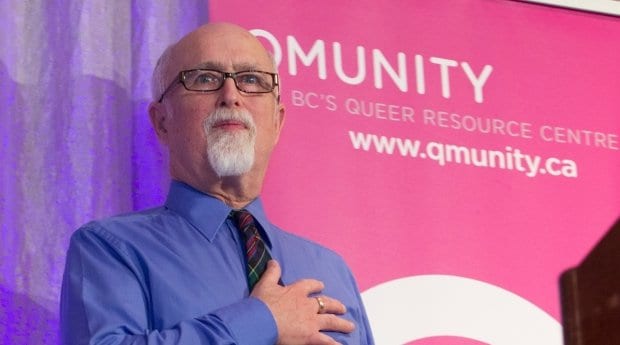Gay seniors need to feel welcome, included and respected, nearly 500 guests heard at Qmunity’s sold-out 10th annual International Day Against Homophobia breakfast at the Fairmont Hotel May 16.
“Seniors grew up in a time when being gay meant you were seen as a criminal, and often pathologized, because gay was seen as a disease,” Qmunity executive director Dara Parker told the crowd. Not surprisingly, Parker says, many gay seniors are now reluctant to open up and share their stories.
Qmunity chair Morgan Camley says senior LGBT people are still largely invisible. “In many ways, this is our first out generation of seniors,” she notes. “Sadly, the number-one fear among older adults in the LGBTQ community is that, as they move into care homes, they are forced to go back into the closet. It’s not right that the generation of pioneers who fought for my rights to live out of the closet are now going back into the closet.”
“There’ll be no closet for me,” 71-year-old lesbian pioneer Chris Morrissey tells Xtra. “I do think that those of us who are in a position to be out need to be out, because that’s the way change has happened.”
“There needs to be policy, and it’s great to have policy,” she continues, “but practice doesn’t change just because policy does.”
After a lifetime of activism, Morrissey laments the need to keep fighting for rights and respect as she ages. “We’ve been doing this stuff, and now, the thing that I find hardest is having to continue to do it. It’s sort of like we’ve been on the front edge for all of these issues and now we are all aging. There’s that sense that, ‘Oh god, here we go again.’”
Camley agrees. It’s unfortunate that many queer seniors continue to face discrimination as they age, especially since they come from a generation where many of them “lost many of their friends to HIV and AIDS and were marginalized for who they were, and in turn were often isolated from their families and less likely to have had children.”
Qmunity has, since 2001, run the Generations Project, the only support and resource program for LGBT seniors in BC. For the last two years, Qmunity has also been working on a project called Aging Out, Camley says, “which tackles the crippling fear of having to re-closet as we age.”
“Regardless of sexual orientation or gender identity, getting older can be scary,” says Anita Braha, chair of Vancity, which sponsors Qmunity’s annual breakfast event. “Research shows us that LGBTQ seniors have a difficult time getting support in physical and mental care, and this is a burden that we face based on the discrimination that we’ve carried for so long.”
Other speakers at the event included Gary Paterson, the first openly gay moderator of the United Church; senior LGBT activist Don Allison; and Isobel Mackenzie, BC’s first seniors’ advocate, who was appointed by the Ministry of Health in March.
“The system would come crashing down without that small army of people out there advocating on behalf of our seniors,” Mackenzie says. “We have to make sure that our system recognizes the difference and uniqueness of what family might look like for gay, lesbian, transgender — queer community — that are our seniors.”
“Coming out of the closet isn’t a one-step process; it’s a journey through fear,” says Allison, who is 70. “I believe there is a deep sense of isolation and loneliness for many lesbian, gay, bisexual and transgender seniors. So many of us have struggled to live through fear, repression and isolation.”
Younger participants attending the event praised the trailblazers before them.
“As a younger queer woman, it just blows me away — the courage and resilience of the people who came before us,” Parker said, “and what a privilege it is today to stand here and enjoy so many of the rights and freedoms that have been fought for and won by the great pioneers that came before me.”

 Why you can trust Xtra
Why you can trust Xtra


